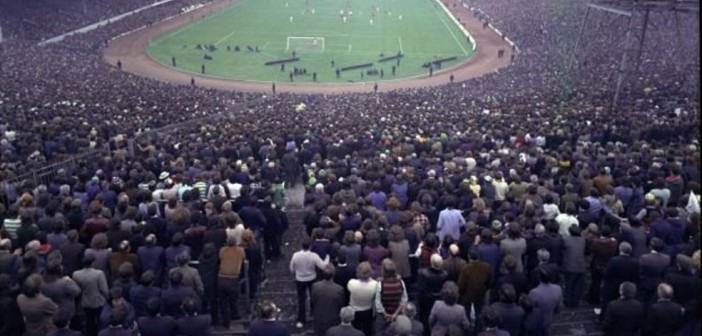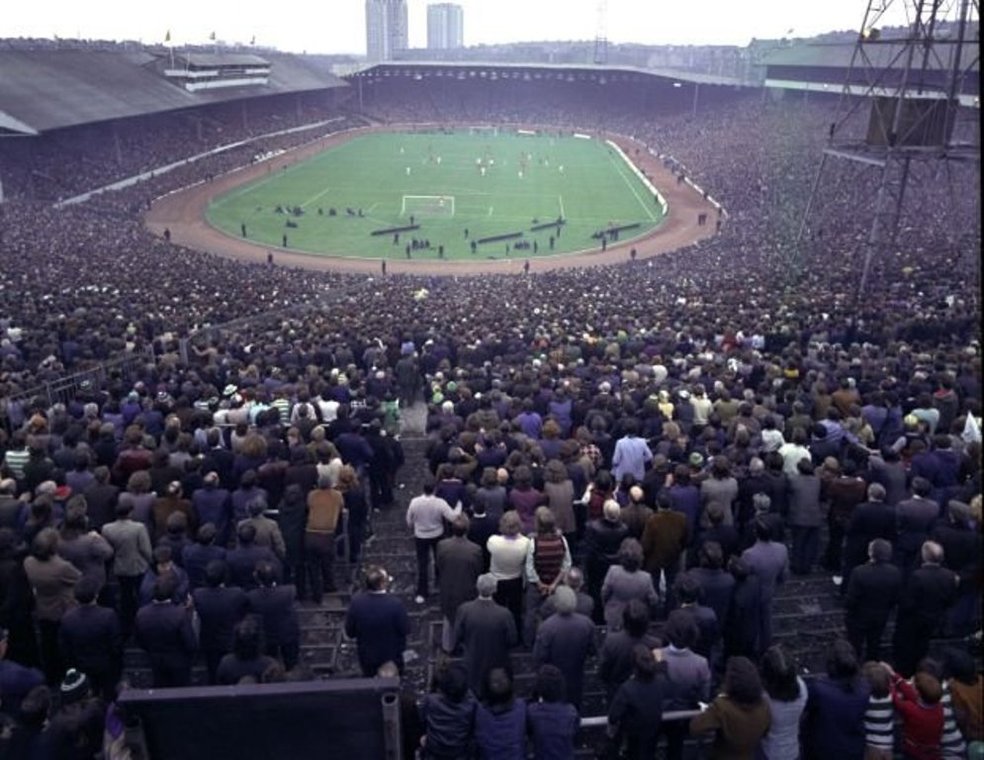Mike Maher who now lives in New Zealand, faithfully followed Celtic home and away during the 9IAR years. We asked him to write about what it was like supporting the club during these glory years. What follows is a truly wonderful account. You can almost hear the songs being sung on those supporters buses in the 60s and 70s…
I have often thought that I was lucky to become a Celtic supporter at the time I did. Sure the first 5 years were not exactly rewarding trophy wise but that just made me appreciate more the great years following the arrival of Jock Stein. When big Jock took over at Celtic Park I was just 14 years of age. Old enough to be able to go to most games by myself or at least in company of friends. 10 years later when that glorious decade in Celtic’s history came to an end I was 24, not yet too old to have social, family or work commitments that would stop me going to the games. I was able to go to virtually any game and took full advantage of that position. Of the 306 league games Celtic played during the nine in a row seasons I missed only 7. In that same period only one league cup game did not have my attendance. All Scottish Cup games were attended and as well as the home European games I managed to get to 7 games outside Scotland. Throw in a few testimonials and friendlies in England and you can see I covered a lot of miles following the Bhoys.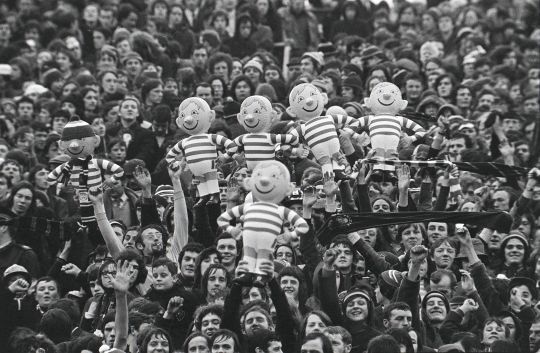
Like most people my early Celtic experiences were mostly witnessed at Celtic Park. Parkhead was a relatively short trip from Baillieston and my first visits were mostly with my father or with my friend, Peter’s father. Soon Peter and I were able to go on our own and would take the tram or bus for the princely sum of three pence. The fare to Parkhead Cross was actually four pence but we would get off at the fare stage at the bottom of Westmuir Street. This not only saved a penny but gave us the opportunity to visit Peter’s Aunty Betty who lived in the tenement right beside the bus stop. Invariably that meant getting some biscuits and a drink of ginger before making our way up to Paradise.
In my early teens my family moved further out to Bellshill. Although the distance was a bit greater it was still an easy task to get to home games. Plenty buses passed Bellshill Cross en route to Glasgow City centre and all went via Parkhead. In addition from Bellshill there were buses to Coatbridge (and then to Airdrie) as well as Motherwell and Hamilton. That meant I could also now easily get to see the Bhoys when they were in Lanarkshire and if Celtic were away from home I could still get to a game of football if I wanted at the likes of Fir Park or Broomfield. Bellshill train station was also handy and gave a short trip to Glasgow Central and made train trips to venues like Hampden and Love Street a lot easier.
When Jock Stein was appointed I just knew success would follow and I wanted to be part of it and follow the Bhoys everywhere I could.
JOCK STEIN
The first game of Big Jock’s first full season was a League Cup sectional tie at Tannadice. As the song says “how are we to get there without a motor car?” Public transport would be the answer of course but it would be the longest journey I had made on my own. Then fate stepped in. Some 5 years earlier my mother’s brother Eddie had taken a job with Timex in Dundee. By now he had a managerial position and regularly commuted between his home in Monifieth and the factory in Besancon. The day before the game he would be flying in from France so arrangements were made to meet in the city centre and then get the train from Buchanan Street Station up to Dundee.
On the Saturday Eddie and I got the bus into Dundee and together we stood on the terracing to see Celtic lose 2-1. In fact Celtic lost 2 of their first 3 games but recovered to get to the last day of sectional matches on top of the group. Public transport had got me easily to Fir Park for the other away group game but the clincher would be back on Tayside. This time at Dens Park. The winner of that game would top the group. The family option was not available this time so it looked as if I would have to make my own way. Then a suggestion by a school mate that would change my whole approach to going to games and introduce me in a sense to a new way of life.
THE SUPPORTERS BUS
“Why not come on the Supporters Bus?” That was John Fagan’s idea. He went regularly with his Dad, cousin and uncle. I had never really thought of using a Supporters Club bus before. With Celtic Park not far away by public transport I had never seen the need. Going to school in Coatbridge meant you could not avoid knowing about the Celtic Supporters buses. There were plenty – Dundyvan, Phil Coles, Merryston, Hutton Street, Whiflett St Mary’s etc. At that time the Celtic support did not enjoy the same reputation as now and to some people these buses were viewed as carriers of drunken hooligans so I was not sure what my parents would think when I asked them. However my father, although by now only an occasional attender at home games, had been a founder member of the Carfin Celtic Supporters Club after the War. He reckoned it would be all right and I was set to go.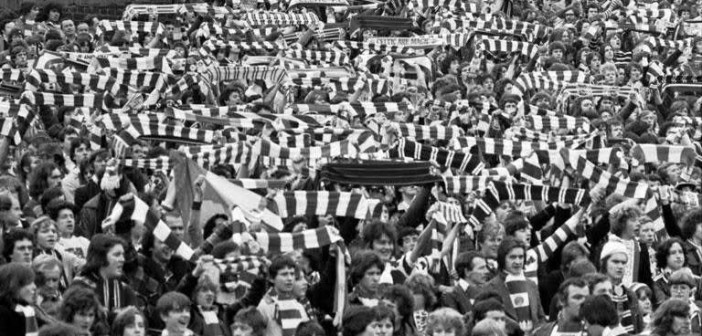
John was a member of the Kirkwood Club and that so it was with them that I set out on that sunny Saturday at midday on the road and the miles to Dundee. It was at that stage my most enjoyable trip to a Celtic game. In those days there were no motorways or bye-passes so we actually went through places like Stirling, Bridge of Allan, Dunblane, Aberuthven, Blackford, Auchterarder and Perth. Often at a crawl with the locals looking on at this line of passing buses with their singing passengers.
I found that the Kirkwood bus was to be like many others I would travel on over the next few years. No drink was allowed on the bus and although it was not the type of place the archetypical maiden aunt would enjoy there was never any real problems. The passengers were in the main ordinary working class guys (very few women). They could seem raucous but that was mainly due to the passion for Celtic. They were knowledgeable about their football and in a time when there were hardly any books about Celtic their stories were how the next generation learned the Club’s history. There were generally opinions on politics as well and some of my early interest in Irish history was stimulated by hearing the debates and songs on these buses.
BIG YOGI
Anyway on that day in September 1965 we arrived in Dundee after a journey of around 2 and a half hours. I had enjoyed the banter on the way up and had participated in that other great custom of the Supporters buses- the first goal sweepstake. I had drawn “Celtic 11” When the teams were announced I discovered that position would be occupied by John Hughes. As Big Yogi was himself from Coatbridge I considered it a good omen. As it was John Divers opened the scoring and Celtic went on to win 3-1 and thus progress through to the quarter finals.
It was on the journey back that I was really struck by the impact of the travelling Celtic support. As we waited at the end of Clepington Road to get on the main road all I could see was a long line of buses all the way down the Kingsway starting the journey back down the road. I really now felt part of the Celtic family. The trip home took an alternative route to enjoy a refreshment stop at Milnathort. Before we got there however there was a decision to be made regarding the first goal sweepstake. The guy who had drawn John Divers had decided to stay on in Dundee with some mates and was not on the bus. Some debate ensued regarding the pay-out of the prize. I wondered if there was some “Supporters Association Sweepstake Rule Book” to be consulted. A suggestion that the money should go the second goal scorer raised my interest as that had been John Hughes. Eventually the decision was reached. Holder of the second goal scorer ticket would get the prize. Part of the reasoning I heard was that the original winner “would just have wasted it on drink anyway – so give it to the laddie”. I then proceeded to waste it on extra servings of Irn Bru in Milnathort!
For the rest of that season I was pretty much an away game regular on that bus. I was making first time visits to most grounds in the First Division- Brockville, East End Park, Easter Road, Annfield, Cappielow, Rugby Park and others. The game itself was only a part of the whole match day experience. The banter on the bus, passing through parts of the country I had not seen before, seeing the large fleet of buses in the parking area afterwards, many with their own distinctive club badge and then the journey home discussing the game and the other results of the day. I had found the ideal way to spend a Saturday.
THE BIG TREE BAR
By the time the following season came along John had moved to Whifflet and had joined the St Marys Club so for that glorious season most of my away travels were with that club. I did miss one game however. On a very wet February afternoon I was on a half full bus waiting our departure for the game at Annfield against Stirling Albion. John and his father had not turned up and some folk were doubting if the game would go ahead in view of the heavy rain. Somebody went into the Big Tree Bar and used their phone to contact Celtic Park. He came back onto the bus to announce the game was off. We all got off the bus. Rather than go home I decided to get my football fix for the day by going to Broomfield. I had several school friends who were Airdrie fans so I joined them on the terracing that day. They were surprised to see me as they had been listening to the radio to see if their game might be postponed and could not recall hearing that the Celtic game was off. I was now having some doubts myself and these were confirmed when the Half Time Scoreboard advised that Stirling Albion were leading Celtic 1-0. I was annoyed to say the least. Not only would Celtic have to play without me (they did get a second half equaliser) but that was the only domestic game I missed that entire season and indeed would the only one I did not attend for the period from January 1966 to December 1971. On the bus the following Saturday for the trip to Love Street I discovered that the person at Celtic Park answering the call as to whether the game was on or not presumed the enquirer was meaning the reserve game at Parkhead between the same clubs and that had indeed been called off!
Those were great times to be following the Bhoys and many of my school mates were in the growing band of followers. For home games a large squad of us would gather together in the Celtic End where we considered ourselves to be an important part of the “Celtic Choir” This was in the days when the singing was more spontaneous and did not have to have a D J leading it. The Jungle was not then the place for singing it would become later (although it never matched the Celtic End at its peak).
PHIL COLE’S BUS
As more of us were travelling to away games too it was not always possible to go together on the same supporters’ bus as most of us were not actual members. Accordingly during the 1967/68 season many of us started using a famous method of getting to away games- Phil Cole’s Bus.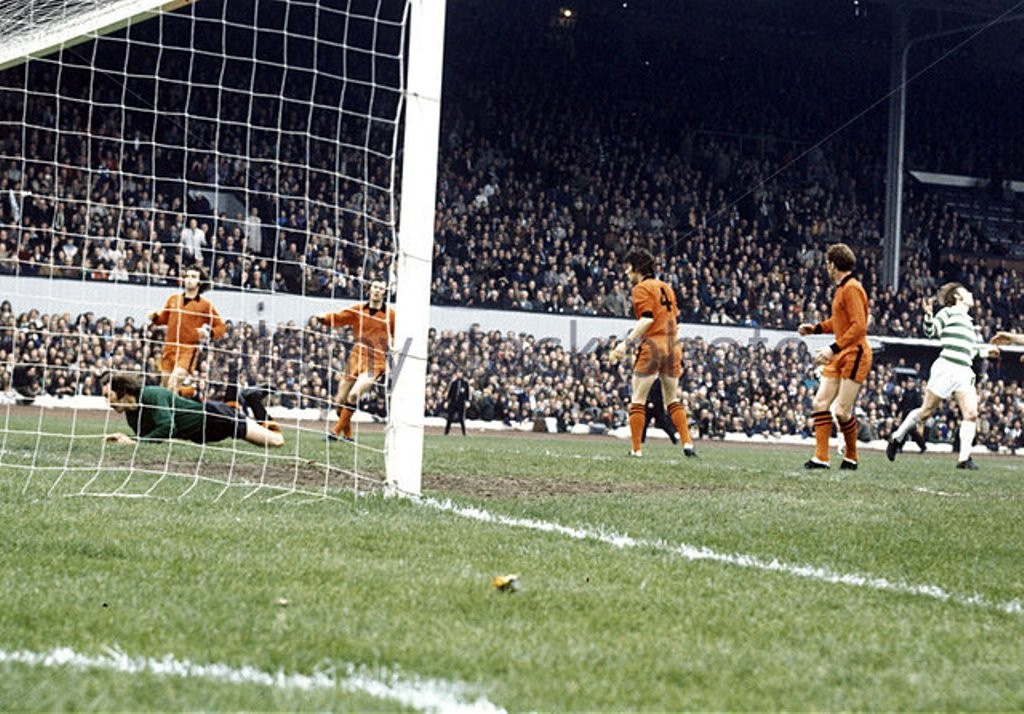
Phil Coles was a Coatbridge and Celtic institution. It was different from the other Supporters Club in those days as it did not have then an organised membership. There were the regulars as well as many like us who used it for certain games. It also seemed to be a “last chance saloon” for some who had become not exactly welcomed on other buses. Unlike most of the other clubs drink was not banned on the bus. In fact it seemed almost compulsory. Despite that I never felt in any way concerned on my travels. The language could certainly be industrial to say the least but as long as you were open and not “up yourself” things generally were fine. In contrast to the Club’s reputation Phil himself appeared to me anyway to be a nice quiet gentleman. By that time I don’t think he any longer owned the pub that bore his name but he would be there every Saturday organising the buses. And yes that is plural. For lots of games several double deckers would leave the pub. One game I recall in particular was the “World Championship” game with Racing Club at Hampden. On that occasion there would have been at least 30 buses lining up in the street ready to pick up passengers from outside the pub. I was waiting my turn to board when Phil himself came up to me and told me that he was going on the bus just about to leave and I was in charge of the next one! I was still at school and did not fancy having to control a bus with around 60 or so hyped up fans on board nearly all of whom were older – and bigger- than me. However I did my best to ensure no one was left behind after the game and took the collection for the driver.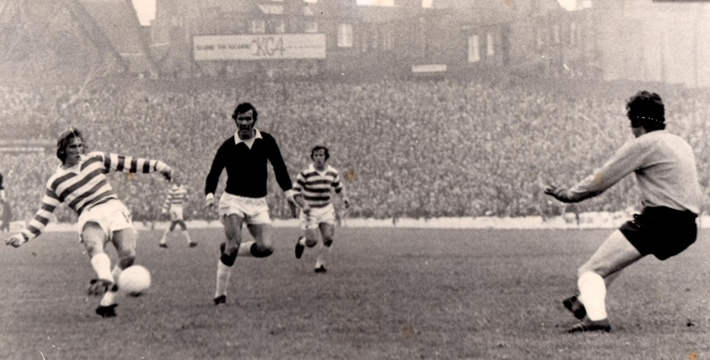
Ticket games were not as common then but they did happen. No matter how scarce they were tickets always seemed to be available through Phil Coles. If that was the case I would nip down to the pub during lunch hour and ask for tickets at the little side door that was used for off sales. On a couple of occasions Phil would tell me just to come to his flat and pick up tickets there as that was nearer the school. And no matter the game Phil Coles would always have a bus going. That was particularly helpful for midweek trips to Pittodrie. That kind of fixture was difficult for many other Clubs to justify the cost of running a bus. One such occasion was in April 1968. Celtic were trailing Rangers narrowly in the League race and an away win at Aberdeen was vital. As the game fell during the Easter break about 8 of us from the school met at Phil Coles for the 2.30pm departure. Although under pressure for most of the game a Bobby Lennox goal clinched the points and it was a happy trip back down the road. Most of the adult passengers had of course gone for a few pints before the bus left the Granite City and soon tried to grab some sleep. With no school the next day we had no concerns so decided to pass the hours with a sing song. The usual Celtic songs were sung before we moved on to the more “political” ones. To make it more interesting it was decided they should be sung in chronological order. Thus we started with the likes of O’Donnell Abu and the Minstrel Boy before working our way through The Boys of Wexford, The Bold Fenian Men, Robert Emmett, The Foggy Dew, Johnston’s Motor Car, the Boys from the County Cork, The Old Alarm Clock and so on up to Sean South with the occasional argument along the way such as whether Kevin Barry was before The Boys of Kilmichael. Considering that none of us did any formal studying of Irish History at school you can see that travelling on the Supporters buses was an education in more ways than one!
A GRAIDH MO CHROI
That is not to say that the Phil Coles regulars needed us schoolboys to get the singing going. There were plenty others capable of that. The usual format was John Sullivan initiating the proceedings with A Graidh Mo Chroi and everyone joining in. This was especially the case if passing through an area that was deemed to be particularly loyalist although I was never sure quite how that categorising was worked out. It was also through songs on this bus that I learned about the 7-1 game which was played just a bit before my time.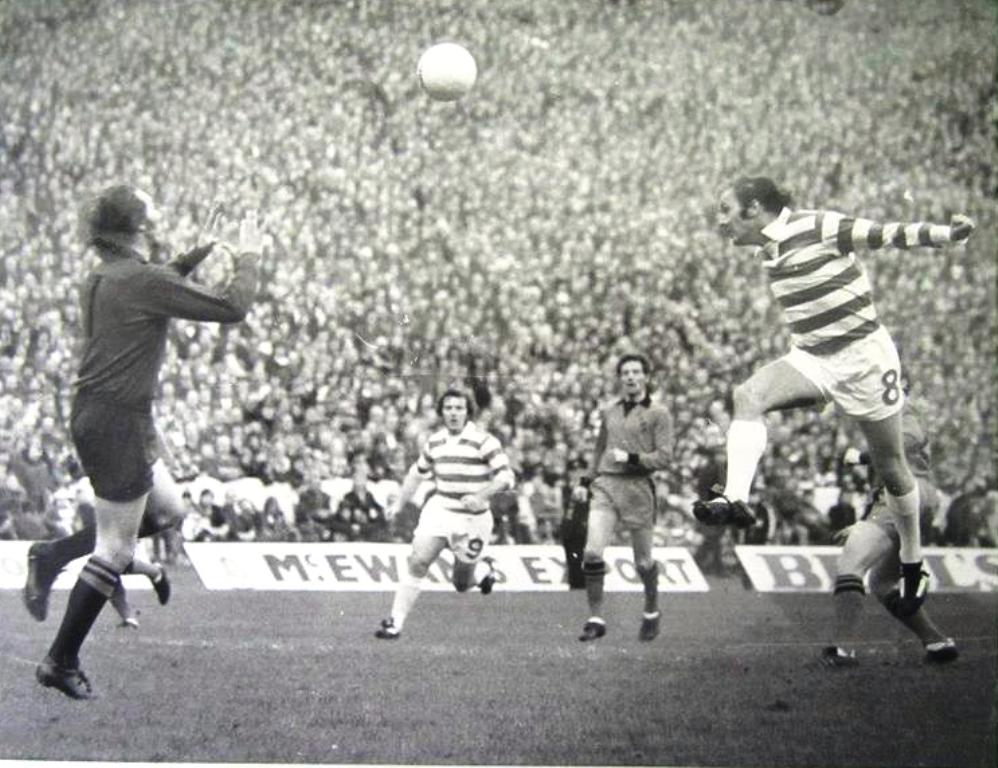
For singing though the best trips were with the Newarthill Jock Stein Club. For a while my uncle James was the convenor and invited me along to sample the hospitality on the away games. Once again it was a bus that did not allow drink on board but that certainly did not inhibit the fun on the journeys. On the way to the game it was community singing of the usual Celtic and Irish songs but also with other folk songs as well as the latest hits of the time from the likes of the Beatles and the Beach Boys. After the match there would be a stop for a few refreshments which helped lubricate the vocal cords for the journey home. My mother’s cousin, Frank, was the bus driver but also had another important role- Judge! Routine was one side of the bus against the other in a singing competition. An individual from the left side followed by someone from the right with Frank giving his points for each participant. I don’t remember there ever being a prize as such but a great way to pass the time on the homeward journey. And there were some good singers. Charlie Devine had a great voice and his regular contribution was The Boston Burglar. My favourite was a wee stocky guy whose version of Sixteen Tons would have put Tennessee Ernie Ford to shame! And of course that “education” factor. A popular song on that bus (and I have never heard it anywhere else) was entitled The Smashing of the Van. However the song was not about the Manchester Martyrs but about an event in Glasgow which I had never heard of. The opening lines were – it was on the 4th of May in 1921 the news went round all Glasgow town that a daring deed was done. The song told how a police van containing some IRA men was attacked by their supporters in High Street in an attempt to free them. For a long time I presumed the tale was a myth or at most an exaggeration of a smaller incident. Then many years later on a visit back to Glasgow I passed some time in the Police Museum. The main display depicts an event in Glasgow Police history. On the day I was there the board at the start of the display stated- “On the 4th May 1921….” It was the story of what had indeed happened as described in the song. Once again education on the buses!
SWEEPSTAKE
A good friend of mine- Brian McHenery was a member of the very well organised Muirhead club. By virtue of a weekly fund raising sweepstake travelling for members was subsidised meaning only a reasonably small weekly travel charge for members irrespective of venue. The fund raising also helped towards the Aberdeen trip which in those days usually meant an overnight stay. I had occasion to travel with Brian on one such occasion although had to pay more as a non-member. Unlike the members I also had to pay for my meal at the lunch stop at Inverbervie. (The fact that most called the place “Infurabevvy” indicated that lunch was mostly of liquid variety). After the game at Pittodrie it was back to the digs for a meal before heading out for a night on the town. Brian knew a club that always welcomed the club members which took care of getting a drink after the then usual 10pm closing. The relationship between Aberdeen and Celtic fans in that era was generally very cordial and trouble was rare. Sunday morning usually saw a good attendance at the local morning mass before the journey back down the road.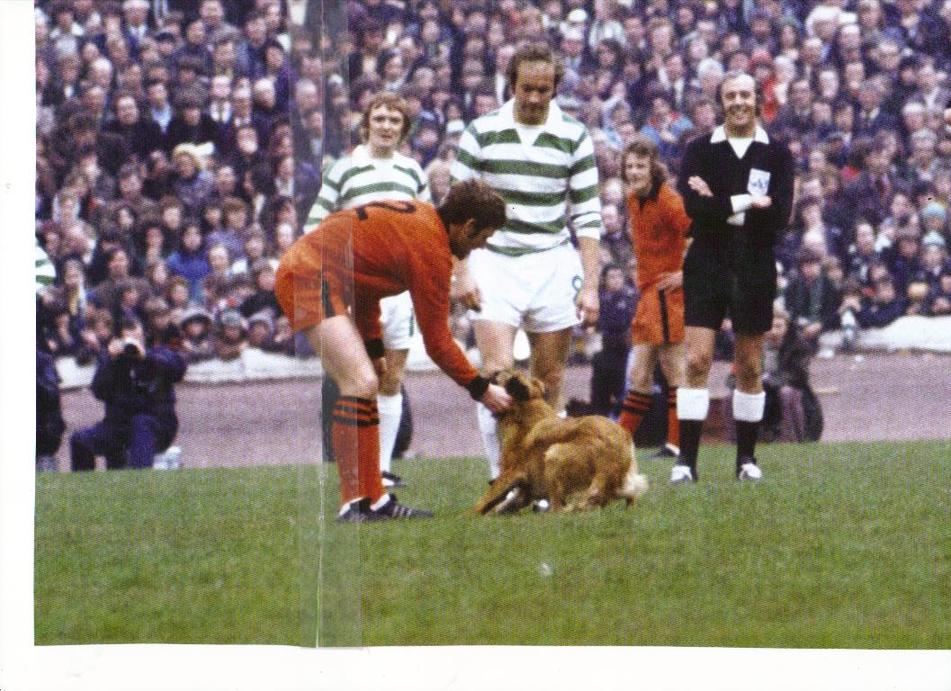
Much as I enjoyed the away trips on the buses I had to change my travelling method over the last few years of “9 in a row”. I was never much of a footballer myself but I did enjoy playing the game. However I had always preferred watching but then came the chance to do both. I got involved with a team in the Strathclyde Civil Service League. I was not a Civil Servant, nor indeed were most of my team mates but that did not matter. And as the games were mostly in the greater Glasgow area with 10am kick offs there was plenty of time to play and still get to see the Celtic. However it could be a rush to get back in time for the Supporters bus for some away games so a group of us decided to start our own “car club”.
There were 5 of us with access to 3 cars. A few weeks before the start of the season we would meet in the back room of Yogi’s Bar armed with the Fixture List and the AA Road Guide for Scotland. The games against Rangers and Aberdeen were excluded from our plans. No one was keen to drive all the way to Pittodrie and back without the chance to have a few pints, and safety in numbers was the slogan for games at Ibrox. So for those 2 fixtures we would use a Supporters Bus. The remaining away games were split between the 3 cars. We divided the games as evenly as we could from a mileage point of view so that, for example whoever drove to Dens Park would not need to drive to Tannadice or Muirton. A calculation of the total mileage was made along with petrol costs estimates and we finally would arrive at a figure that each person would pay at each trip irrespective of the length of an individual journey. So the cost was the same whether the game was at Perth or Paisley, Kirkcaldy or Kilmarnock.
FISH SUPPERS
Travelling by car meant we could be more flexible in departure and return times. In those days there were 18 teams in the top division and each away ground was visited only once. Also there were occasional trips to places like Ayr, Cowdenbeath, and Methil when the local teams found themselves in the top division. We enjoyed the travelling and one of the regrets we had was that Celtic rarely travelled in the Scottish Cup as we would have fancied a day out at the likes of Brechin or Berwick. (As an aside – during Celtic’s nine in a row years we played 25 Scottish Cup games excluding Semis and Finals. On 20 occasions Celtic were drawn at home. 2 of those away games (Dens Park and Tynecastle) were in 1965/66 and the furthest away game after that was at Fir Park in 1972/73. The only other away games were at Firhill and Shawfield in 1968/69 meaning that for 6 consecutive seasons Celtic did not play a Scottish Cup tie outside Glasgow.)
However that was a minor disappointment as we had great times on our travels around the country. As well as the game to enjoy we had the opportunity to refresh ourselves in various hostelries. For some reason one of our favourite haunts was the St Johns Toun Tavern in Perth which was often the post-match venue for games in the Tayside area. We would grab fish suppers from the chip shop across the road and eat them in the pub while watching TV. Then into the back room for a few games of darts or dominoes. Of course there was always some negotiating to be done between the driver for the day and the passengers. Invariably the driver would suggest a quick pint and then head back home so he could dump the car and have a few beers himself. The passengers however would always suggest there was time for the famous “just one more” which was never one of course. Everyone appreciated the need for compromise though as a driver one week would be a passenger the next and vice versa.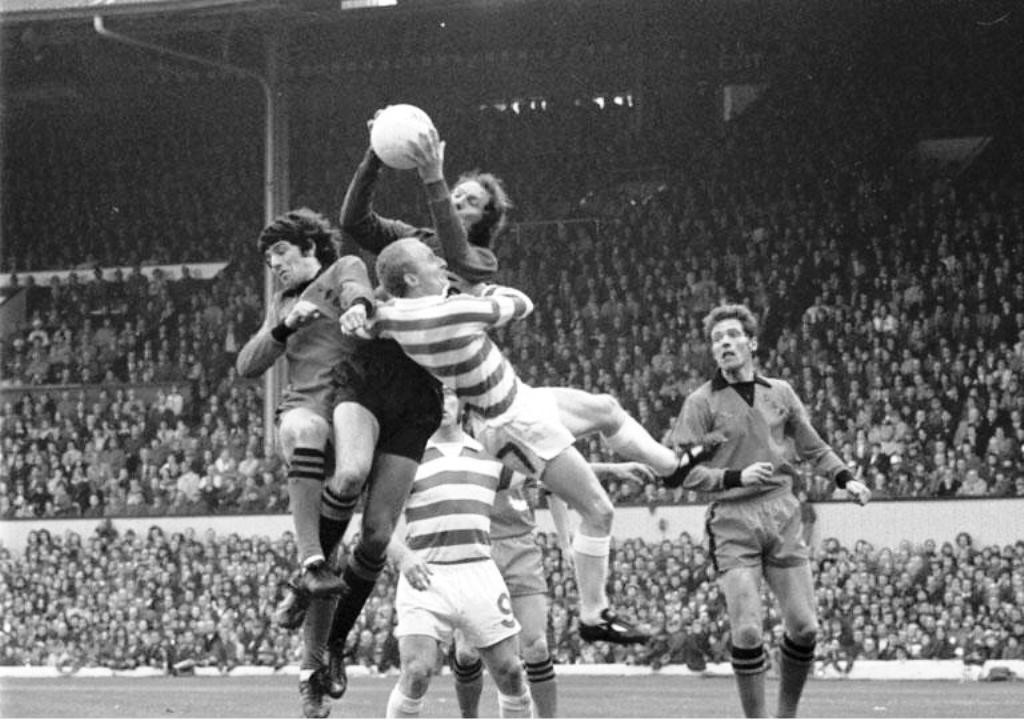
Not all trips went smoothly. One day on the way to Easter Road that day’s driver, Gerry Murphy, announced that after the game he was intending to visit an aunt in Penicuick. We were invited too but for some reason tea at Gerry’s relations did not have the same appeal as a night in Rose Street so we opted to stay in the capital. Arrangements were made to meet at an agreed spot at 10pm. However we were to discover that the agreed spot was not the same for both parties. By 10.30 the four of us standing at the corner of Hanover Street were beginning to consider Gerry might not be appearing. No mobile phones in those days to contact him with. And at that time no “plastic money cards” either. As we had assumed a lift home virtually all our money had gone to boost the shares of Scottish and Newcastle Breweries so we did not have enough for train fares. Possibly it was the effect of the beer but we were not feeling too concerned and our optimism was rewarded at almost literally the 11th hour when Tom Tumilty strolled round the corner. I had not seen Tom since the last year at school. He had been a reasonably regular member of our group that went to the games in those days but on this occasion he had not been at Easter Road but instead had gone to the Scotland V Ireland rugby game at Murrayfield that afternoon with a couple of University mates. At first I was puzzled. I did not think many people in Shawhead could spell rugby never mind know the rules. I presumed he was studying to be a lawyer or accountant and was getting involved in things that would help his career. No matter. Rugby people were meant to be better off than football people. Not only had that but better organised too. Tom and his mates had return train tickets and some spare cash. Between the seven of us we managed to scrape up the fares so that would not be stranded in Edinburgh. The next week Gerry pleaded his innocence saying he was at the agreed pick up spot. However as there were 4 of us and only 1 of him the vote went against him and fines in the shape of several rounds of drinks were imposed!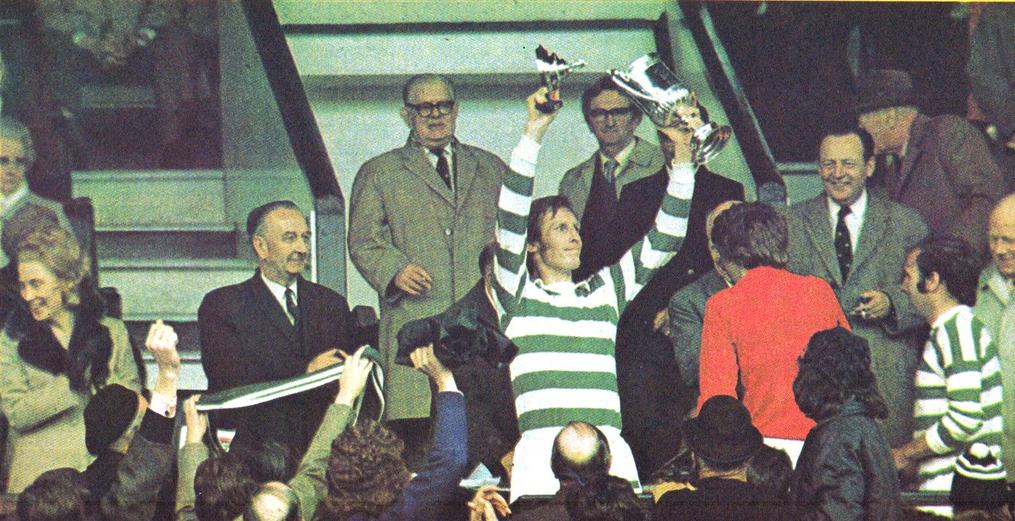
By the time season 1973/74 came along Celtic were in a sense beginning to pay a price for their dominance of Scottish football. Crowds were dropping and I certainly noticed a difference in attitude among many of the guys I knew. Some who had been regular attenders in previous seasons were now picking and choosing games. Apart from the Rangers game which had a 55,000 crowd only the visit of Dundee brought a crowd of over 35,000 to Parkhead. (That game against the Dens Park side was Celtic’s first ever Sunday League match and that novelty probably helped swell the gate to 40,000). Some games did not even attract 20,000 as despite the challenge from a good Hibs side there was a feeling of inevitability about the title coming to Parkhead. Away crowds were still reasonable and we could always fill our car although it was not always with the same personnel.
ONLY 76,000 AT THE GAME
The Scottish Cup final probably summed up my feelings that season. It was against Dundee Utd who were not yet the threat they would become a few years later. Only 76,000 were at the game. My first experience of a Celtic Cup final crowd of under 100, 000. Celtic were 2 up after the first 24 minutes and the game was never in doubt. Boredom set in on the terracing and after some bottles were thrown near us the police came in to arrest the first couple they could grab without worrying too much about their likely guilt.
That summer I had another new experience – watching Scotland participate in the World Cup finals. Maybe it was watching that that made me think of life away from Scotland but when I saw an advert in the company bulletin board looking for people who would be interested in working in our offices at the other end of the world I applied. After interviews I was successful and I realised I would soon be no longer travelling with my friends following the Bhoys. As I was to discover it was certainly not the end of my time supporting Celtic but for the time being it was no longer a case of being on the one road but the road to God knows where.

